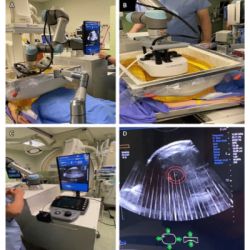The development of artificial intelligence (AI) in radiology has prompted leading radiological societies in AI technology to issue a statement on a new ethical framework.
The statement was authored by European Society of Radiology (ESR), the American College of Radiology® (ACR), European Society of Medical Imaging Informatics (EuSoMII), Canadian Association of Radiologists (CAR), Radiological Society of North America (RSNA), American Association of Physicists in Medicine (AAPM), and the Society for Imaging Informatics in Medicine (SIIM).
Published in Radiology, the Journal of the American College of Radiology, the Canadian Association of Radiologists Journal, and Insights into Imaging simultaneously, the statement took into account comments from patients, regulators, radiologists and other stakeholders on AI use.
You might also like:#EUSOBI2019: Real-World Guidance for Implementing AI in Radiology
With AI recently making waves within healthcare, there is currently no formal guidelines or standards set for its use. The ultimate goal for radiologists incorporating AI into their practice is to increase patient well-being whilst also reducing harm. The societies of the statement agreed that the benefits and challenges of AI use should be shared amongst stakeholders whilst respecting human rights.
As stated by An Tang of CAR, an appropriate ethical framework is therefore needed to ensure effective implementation of new AI technology. However, J. Raymond Geis of ACR emphasised that even with the development of this new technology, the responsibility of patient care remains with the radiologist. Erik R. Ranschaert of EuSoMII shared this sentiment, identifying the practising radiologist as the key component in addressing the benefits and pitfalls in regards to patient care, and acknowledged the statement from the societies is a step in improving awareness.
Adrian Brady of ESR expressed that these new technological developments showed exciting times for the radiologist and the services that they delivered to patients, whilst Matthew B. Morgan of RSNA also considered the importance of a code of ethics with this new AI integration in his comment on the recent statement.
By gathering information from multiple societies, Marc D. Kohli of SIIM suggested that this could help with the identification of ethical pitfalls of AI and help suggest models for those implementing the new technology.
If AI is to make an impact in healthcare, it is therefore important to have the appropriate guidelines and methods in place. Cynthia McCollough of AAPM also indicated the importance of minimal variability and bias and the role of medical physicists in using this AI-generated data to draw accurate medical conclusions.
Source: ACR
Image Credit: iStock
Latest Articles
Radiology, ACR, the journal of the American college of radiology, Top Radiology Societies Issue Statement on AI Ethics, European Society of Radiology (ESR), the American College of Radiology® (ACR), European Society of Medical Imaging Informatics (EuSoMII), Canadian Association of Radiologists (CAR), Radiological Society of North America (RSNA), American Association of Physicists in Medicine (AAPM), Society for Imaging Informatics in Medicine (SIIM), the Canadian Association of Radiologists Journal, Insights into Imaging, An Tang, J. Raymond Geis, Erik R. Ranschaert, Adrian Brady, Matthew B. Morgan, Marc D. Kohli, Cynthia McCollough
The development of artificial intelligence (AI) in radiology has prompted leading radiological societies in AI technology to issue a statement on a new ethical framework.



























